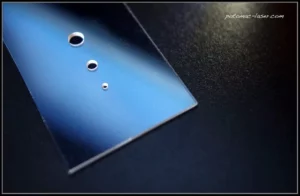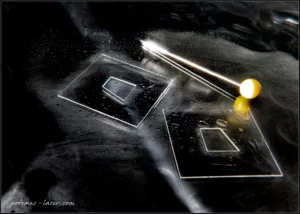
The old days of university research labs having all the time in the world to complete experiments are gone. Like for everything else in the 21st century, time is of the essence for university researchers to compete in the latest grant rounds or to fulfill requirements for corporate partners. Speed is the name of the game in developing prototypes, new protocols, and innovative processes.
It is Potomac’s ability to save time that brought the Biodesign Center for Bioelectronics and Biosensors at Arizona State University’s (ASU) Biodesign Institute to us for laser micro-machining. Graduate Research Assistant Xinyu Zhou explains: “We tried to dig holes in our devices’ cover slips and had so much cracking of the glass, the time we wasted re-doing work was substantial. Potomac saved us valuable time to meet our commitments!”
As described in the group’s Nature article, identification of proteins is key to biotech research. Proteins can lead to disease diagnosis as well as vaccine development, important tools in a rapidly evolving field.

The ASU device needed 2 holes that were 1 mm in diameter and 0.17 mm deep. In addition, the holes had to be placed with +/- 0.5 mm accuracy to ensure the bonding of multiple layers enabled the process to work. Often it is placement accuracy that determines the success of a device.
Xinyu Zhou was particularly impressed by Potomac’s ability to laser micromachine in glass without cracking. Glass is a hard and brittle solid with almost no internal crystalline structure. So, in addition to using lasers in the ultraviolet region of the electro-magnetic spectrum, Potomac has developed unique methods to avoid heat build-up in the process. The result is a clean cut with no cracking.
Glass is an important substrate in many biotech applications. In recent years, more polymers such as COC exhibit the transparent qualities of glass and are far easier – read: cheaper – to machine.
Potomac’s ability to machine glass without cracking, accurately place small features, and deliver parts quickly ensured that the ASU research team could move at 21st century speeds.


